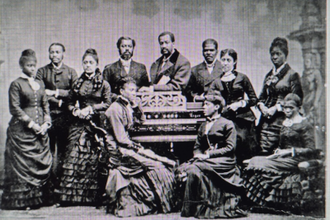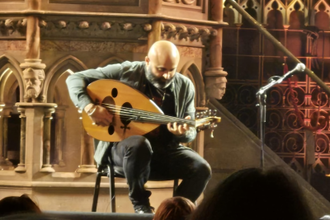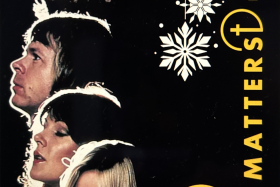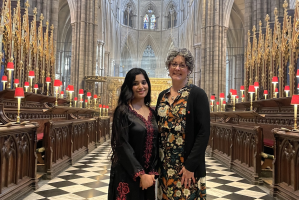Epiphany Birdwatch Report
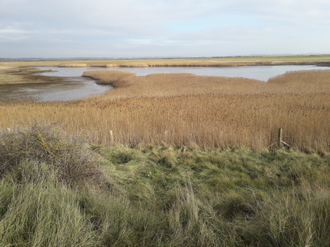
Farlington Marshes
Journalist Philip Crispin went birdwatching on the Epiphany, to raise funds for Medical Aid for Palestinians. He writes:
I went to Farlington Marshes, my local nature reserve just off Portsea Island, at lunch time and under a bright sky.
A crew of some twenty bearded tits, accompanied by a lone reed bunting, were foraging in reeds. The males have striking black whiskers as splendid as those adorning the chops of Emperor Franz Josef. When they flew from one from reed-head to another, the stems gave way like the giant bamboos in the balletic martial arts sequence in Crouching Tiger Hidden Dragon.
A marsh harrier flew lazily over distant reedbeds, with the odd zig-zag change of direction, before ascending up and away. Three dabchicks dived and consorted in nearby shallows, near resting mallards. Teals piped gently to each other in a rivulet through mud flats. Redshanks bobbed and ran over these.
Dark-fronted Brent geese were ubiquitous. Some swam on the ponds and watery expanses. More grazed, often in family groups, with generally two youngsters flanked by their parents, one of whom was generally more upright, keeping an observant weather eye. Many of these would have flown down from Arctic Siberia to these crucial over-wintering grounds.
Canada geese were also numerous, and I was amused to see an odd couple of a barnacle goose and its faithful companion, a 'farmyard white' (like a white greylag) in among them. (When the future Pope Pius II was on an embassy to Scotland in the fifteenth century, he wrote down what is believed to be the first account of the belief in Scotland that barnacle geese emerged fully formed from goose barnacles. This was at a time before winged migration was known about.)
Three black-tailed godwit flew by overhead. The precise etymology of 'godwit' is unknown but now there seems to be a consensus that the name derives from the Anglo-Saxon god wiht: 'good creature'. Numerous references throughout earlier centuries attest that the bird was good to eat with Sir Thomas Browne writing in the seventeenth century that they were accounted 'the daintiest dish in England'.
Curlew and lapwing could be found among the grazing geese, and across the marshes. Both these birds have onomatopoeic names. 'Courlee!' is the bubbling cry of the former. 'Peewee!' the plaintive call of the latter - hence its alternative name of peewit (still a third monicker is green plover). It was lovely to hear both in fine voice and to see decent numbers. Populations of both are in freefall, alas, due to the modern methods of agribusiness, inimical to nature. I remember once spying a lapwing parent dragging its wing along the ground on Hounslow Heath. I expected to see a fox or other predator but no, a muntjac deer (admittedly dog-like) materialised, to take a drink from a pool. Lapwings are ground-nesters and it is a joy to see their stripy chicks who are able to camouflage themselves so well against the ground.
Sweet, speckled meadow pipits foraged among cow pats. I see their cousins, rock pipits, on my strolls along Southsea beach, most regularly by the Castle, where they can often be found near to plump purple sandpipers who have migrated here from the Arctic Circle. The orange-billed oystercatcher also haunts the castle foreshore; I saw several of these large, pied waders at Farlington and heard their shrill cries.
Robins lisped watery songs from bushes, a stonechat flitted from a fence, and crows and gulls, black-headed and herring, were a constant presence. A heron rested among the reeds, raising its sinuous neck skyward when the harrier flew near. A couple of little egrets stalked the watercourses, their black legs terminating in bright yellow claws.
Cohorts of dunlin, small grey and white waders, fed busily in the estuarine ooze. The last time I was here, I saw a great flock wheel and twist over the waters like an airborne shoal, their white underparts flashing in the sunlight. Today they remained wedded to the mud. It was the geese who swept the sky at a certain moment, rising in yapping, panicky clouds.
A large flock of whistling wigeon grazed over a section of the marshes, the drakes sporting a creamy buff stripe up the middle of their head. Shovelers patrolled shallow marshwaters, a group of pintails negotiated the straits of Langstone Harbour, and shelduck were 'showing nicely' in several locations.
A pair of mute swans, a conventicle of coots (they make me think of puritan ministers with their all-black plumage), some skittish moorhen, and a pair of blue tits were the other birds sighted.
A beautiful walk and Epiphany Birdwatch for MAP. Yours in deep gratitude and solidarity.
Philip adds:
A huge thank you to everyone who has supported the Epiphany Birdwatch for Medical Aid for Palestinians (MAP)! I am moved and so grateful for your generosity. I am delighted to be able to share with you these words from Aimee Shalan, the CEO of MAP:
"Sending all the best and heartfelt thanks to you all for supporting Philip's Epiphany Birdwatch for Medical Aid for Palestinians (MAP). As the pandemic continues to wreak havoc across the globe, we are witnessing devastating impacts upon the Palestinian communities we serve. I continue to be so moved that, despite everything our supporters are going through here in the UK, they continue to stand with Palestinians living under occupation and as refugees. The funds raised today will help MAP to continue delivering our emergency COVID-19 response, ensuring Palestinian health workers have the vital equipment and medical supplies they need to support infection control efforts and treat patients. It is individuals like you who give me hope that, the other side of this global crisis, we can build a world of health, dignity and justice for all."
You can continue to support MAP via my Just Giving Page: www.justgiving.com/fundraising/Philip-Crispin



